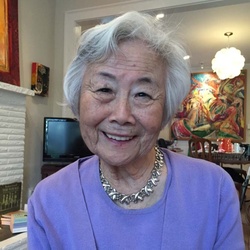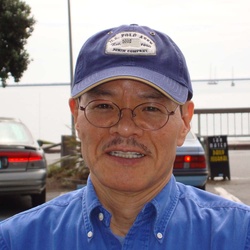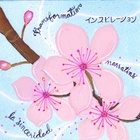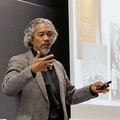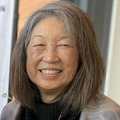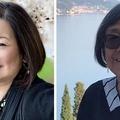This month we feature Suma Yagi, an 89-year-old Nisei based in Seattle whose family was sent to Minidoka during World War II, and Toshi Washizu, a filmmaker originally from Japan who is now based in San Francisco. In light of the commemoration of Executive Order 9066 and the 75th anniversary since its signing on February 19, 1942, their poems are somewhat sobering reads in the context of 2017 and all the reasons we look back in order to take stock of the present and look ahead to the kind of “homeland” we wish to create for our communities. The theme of “homeland” asks us what we imagine home to be and what we do to create a home that is safe and peaceful for ourselves, our families, and society as a whole.
—traci kato-kiriyama
* * * * *
Born in Seattle, Washington, in 1927, Suma (Kato) Yagi was 15 years old when she and her family were forced to leave Seattle due to Executive Order 9066. Her family was sent to the Minidoka concentration camp. Although being sent to Minidoka had a profound impact on her, she shared little of her experience with her children until well after she retired. She took a poetry writing course through the University of Washington Distance Learning program. Through poetry, Suma found a hidden voice that allowed her to share her previously suppressed emotions of being uprooted from her home and being put behind barbed wire. She was compelled to share her experiences so that what happened to her does not happen again.
A JAPANESE NAME
1. My daughter was ten then:
“Mommy, why didn’t you name me Shigeko or Midori
Or some other Japanese name?”
“Roberta Lynn is such a pretty name.
We chose it especially for you.”
My heart smothered words too tearful to speak.
When I was her age,
at the start of each school day,
students would gather to salute the flag.
At first, my baby finger would slip from under my thumb,
while I brought the other three fingers to my eyebrow.
Soon my hand curved with ease.
The word indivisible stymied my tongue,
But the pledge soon flowed like gentle water.
“My country Tis of thee—Sweet land of Liberty
Of Thee I Sing” soothed my vocal chords each day.
We children enacted historical events at school assemblies:
I was a Pilgrim, drowning in yards of black muslin,
set off by a white, full-body apron, and a lady’s bonnet.
Mama sewed them by hand.
I knelt on the shore of Massachusetts.
I thanked God for the plentiful harvest.
I was at the signing of the Declaration of Independence,
where our brown, yellow, and white hands moved across the parchment.
The Thomas Jeffersons with different voices intoned:
“All men are created equal. They are endowed with certain inalienable rights.
Among these are Life, Liberty, and the Pursuit of Happiness.”
Every pore opened to these promises.
The fiber of my being responded.
We children—Asian, African, European—
were bubbles in the melting pot.
They needed me.
DECEMBER 7, 1941
JAPAN BOMBS PEARL HARBOR
I responded: “Isn’t it horrible Japan bombed our country
and attacked us?”
Our voices of allegiance were muted.
The U.S. Government severed ties to
progenies with Japanese names.
Two weeks following all this
an 8 o’clock curfew restricted me to my home,
while others remained outside.
Some children withdrew handshakes.
Signs on telephones poles publicly announced our indictment.
Executive Order 9066, tacked by nails, ordered our mass evacuation.
Treasures I’d gathered during my fourteen years
could not be squeezed into the two suitcases allotted each person.
My heart remained in the stuffed bear,
in the box of my favorite Valentine cards,
with my Shirley Temple doll,
abandoned to find their way
to some other child’s home.
I was interned in a camp with the rest of my family,
a place where rattlesnakes and coyotes made permanent homes.
The six of us squeezed into an eighteen-by-twenty-foot room.
Barbed wire enclosed our new quarters,
guarded by soldiers with guns in watchtowers.
When my child asked why I didn’t give her a Japanese name,
I could only respond:
“Roberta Lynn is such a pretty name.
We chose it especially for you.”
* Reprinted from A Japanese Name: An American Story (Third Place Book, 2016) and first appeared in Prophets of Human Solidarity (B. Krohn and
Associates, 1992) by Richard Cambray. Copyrighted by Suma Yagi.
TWO SYLLABLE WORDS
Dedicated to my mother, Murako Okamura Kato, who nurtured me with these words.
Every evening we would gather around the large round table.
With our meals, Mama would serve two syllable words.
Between bites of food, Mama would say:
Remember gaman and enryo
Do not bring haji to the family
Remember giri to the family
Remember ōn to the family
We children could feel the load of our family
on our small backs.
We could never quite understand
why two syllable words felt so heavy.
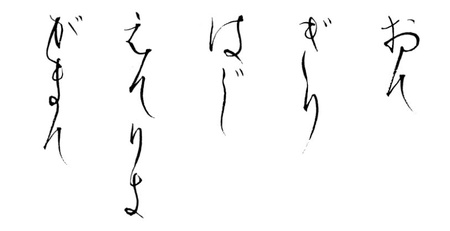
Enryo: Restraint / Thoughtfulness
Haji: Shame / Dishonor
Giri: Duty / Honor
Ōn: Obligation / Gratitude
(Caligraphy:Tad Wada)
* Originally published at A Japanese Name: An American Story
(Third Place Book, 2016) and copyrighted by Suma Yagi
* * * * *
Born in Shizuoka, Japan, at the foot of Mount Fuji, Toshi Washizu never climbed his native country’s highest peak. Instead, in his youth, he crossed the ocean to America. He became a filmmaker and for decades produced award-winning documentary films.
“As a filmmaker, I looked at the world through the camera. Perhaps poetry is another way of looking at our world and trying to make sense of it,” says Washizu.
Homeland / America
Across a storm-swollen Pacific
my father traveled 6000 miles
to a New World
of foreign tongues and different gods.
He settled in
on the edge of a heavenly valley
of many-colored fruits.
“Hakidame ni Tsuru!”—
A crowned crane amidst the waste!—
gasped my father, upon seeing my mother
in the strawberry fields of Watsonville.
“She moved
like a graceful Noh dancer.
A wisp of ebony hair
on the small of her neck.
We were meant to marry
and build our family.”
That was long ago.
The war broke out.
Uprooted from their town
they were driven homeless
to a high desert island,
some from the South,
some from the North,
collected, bundled and carted away
like yesterday’s refuse.
Corralled in barbed wire
they milled about the hard pale ground—
overexposed whiteout, off the map of the world:
No hidden quarters, no partitions:
Mother hung up the sheets
to shield the family
from indecent sunlight and
evil spirits in shadowy darkness.
Father stood silent in the cold,
inhaling and exhaling tobacco,
watching the rationed smoke dissipate
through the fence.
Father simmered. Homesick.
“Where is my country?
Our home?
How can we take sides?
Should we swear allegiance
to America or
Japan?”
I floated in a safe place,
I was too young to know,
heaving with Mother’s rasping breath—
a lullaby of her old country—
warmed by a hibachi
in private quarters.
Soon I would come into this land
of thorny grasses and scrubby bushes—
nothing but dirt.
Where is the America they dreamed—
multi-colored music and
fresh mongrel voices,
embracing and big-hearted—
a home for all the people—
the richest country
in the world?
*Homeland/America was first published in The Walrus in 2014
and copyrighted by Toshi Washizu.
To America
October, 1920
I remember Mama’s face with a half-smile
sadness and fear hidden beneath.
Will I ever see her again?
At dawn the boat pulled from the Yokohama Pier,
the townspeople bowing and waving,
smaller and smaller merging.
We 64 picture brides, in pompadour and kimono,
packed in cabins, hushed as if exiled from our country,
the pictures of bridegrooms tucked in our bosoms.
Two weeks later a sheet of leaden clouds darkened
the ocean. The ship swayed right to left, up and down,
the girls sliding all over like toys with motion sickness.
Alone on deck I shouted against the wind,
“I’ll marry this rich man and send money home.”
I was sixteen.
Next morning the storm clouds
gave way to luminous rays.
The ship steamed eastward.
* This poem is copyrighted by Toshi Washizu (2014).
© 1992 and 2016 Suma Yagi; © 2014 Toshi Washizu




